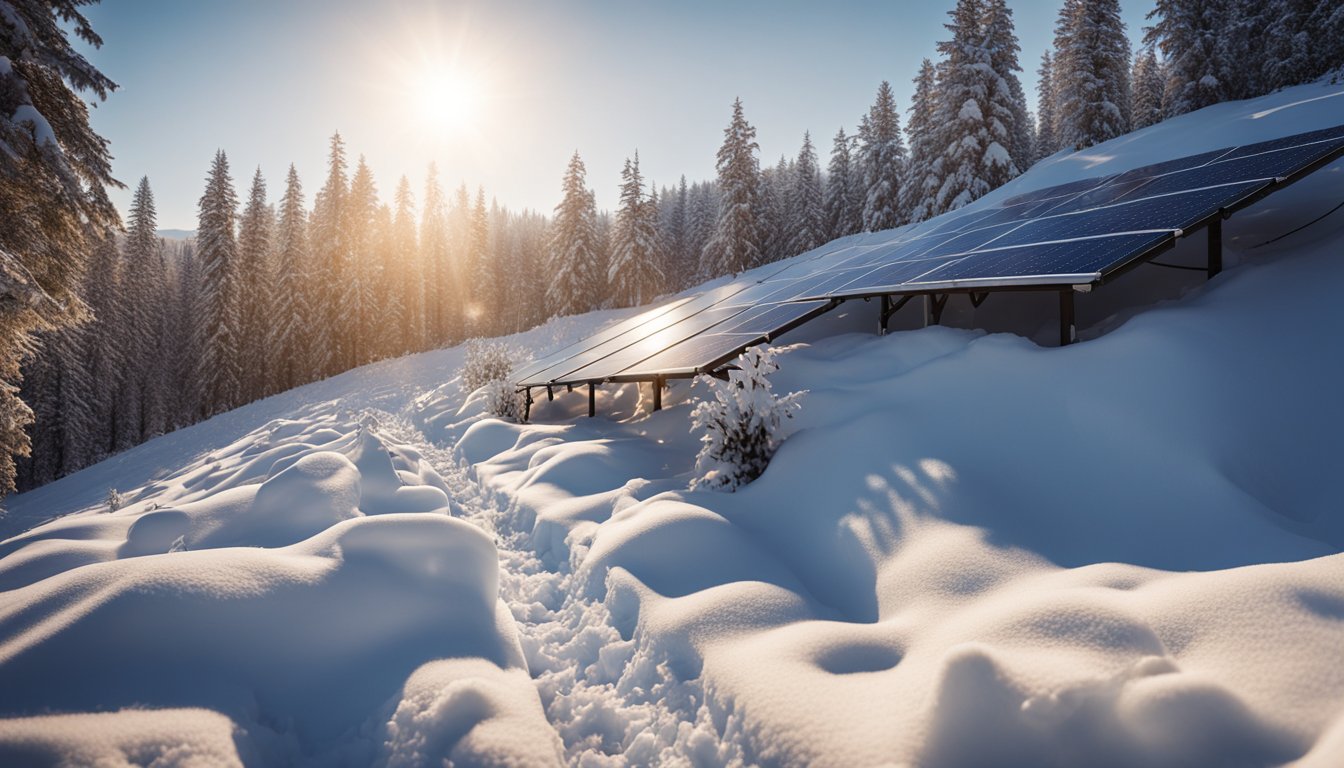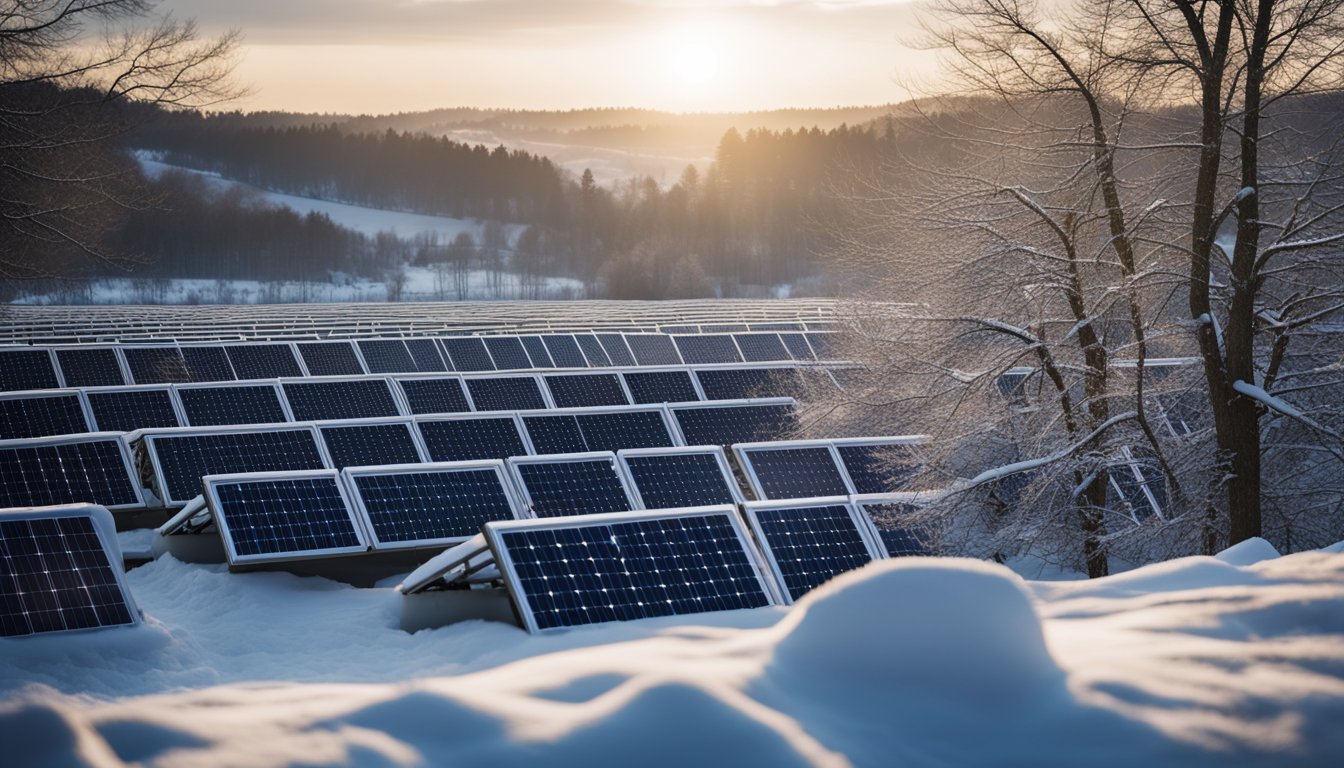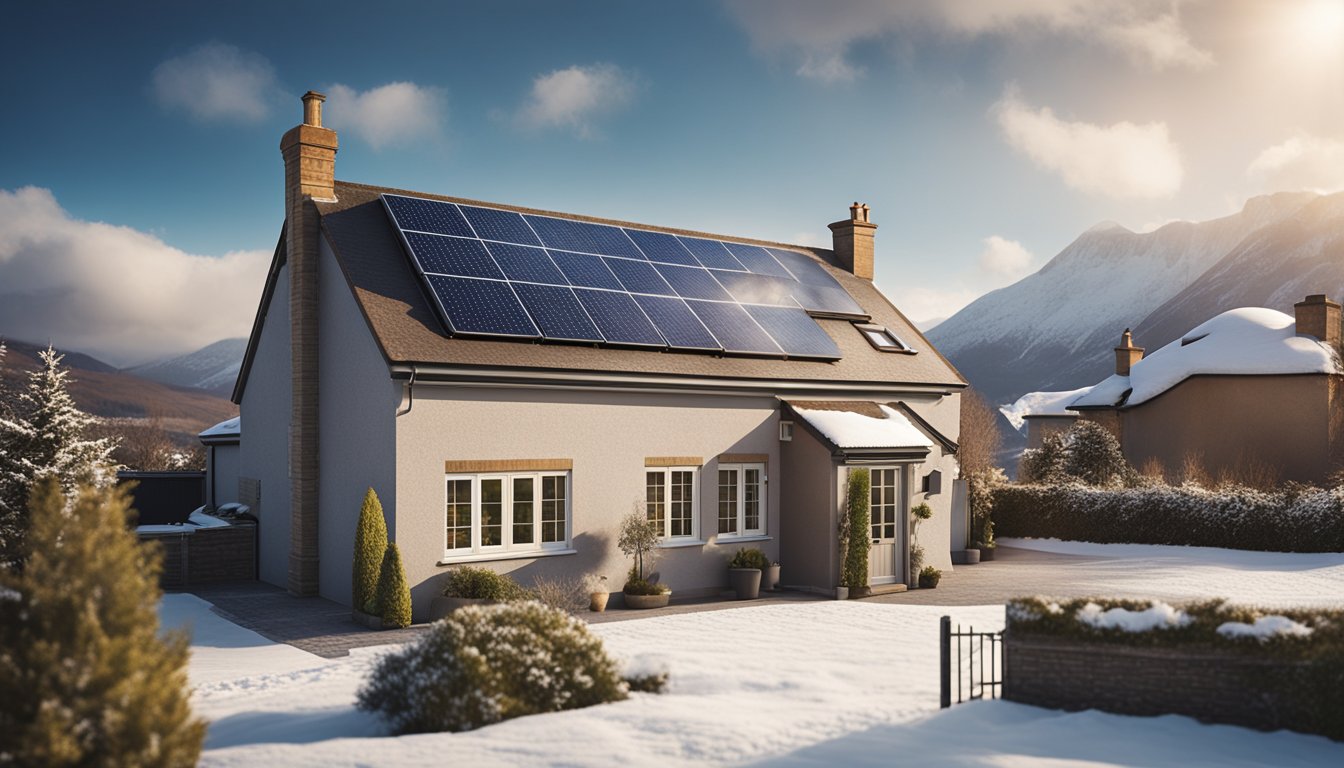Late updated: 16 Nov 2024 10:11
Written by: Eleanor Hartman
Harnessing Solar Power During UK Winters: Optimising Efficiency
As we venture into the winter months in the UK, many homeowners might wonder how effective solar panels can be in harnessing solar energy during shorter, cloudier days. The truth is, while solar panels do experience a reduction in efficiency during winter due to decreased daylight hours, they continue to generate renewable energy even amidst colder temperatures. Understanding how to maximise this resource can lead to significant benefits, both environmentally and financially.

Winter poses its own set of challenges for solar energy production. The limited sunlight hours and often overcast skies can lead to lower power output compared to the brighter summer months. Yet, not all is bleak. Many modern solar panels are designed to perform well in various weather conditions, even in colder climates like the UK's. Proper installation, including optimal panel tilt and orientation, as well as energy storage solutions, can substantially enhance efficiency.
By focusing our efforts on solar panel optimisation, such as adjusting their angle to capture the most sunlight possible and integrating systems with energy storage capacities, we can ensure continuous energy availability. Exploring these strategies can not only address seasonal reductions in solar panel efficiency but also empower us to make a meaningful contribution toward sustainable energy practices.
Key Takeaways
- Solar panels still generate energy in UK winters.
- Optimising panel placement boosts winter solar efficiency.
- Energy storage helps maintain energy availability.
Challenges of Solar Power in Winter
During UK winters, solar panels encounter several challenges that impact their performance. These include fewer daylight hours, lower sun angles, and unpredictable weather conditions. Let us explore these factors in more detail.
Reduced Sunlight Hours and Lower Sun Angle
In winter, the UK experiences much shorter daylight hours. With days often limited to about 8 hours of sunlight, the potential for energy production is significantly reduced. The sun’s lower angle in the sky further complicates this by decreasing the amount of direct sunlight reaching the solar panels.
The reduced solar irradiance results in lower electricity generation. As we aim for efficient energy use, understanding how these factors affect solar panel output is crucial for managing expectations and adapting usage patterns during winter months.
Weather Impacts: Snow Cover and Overcast Days
Winter weather patterns bring additional obstacles. Snow cover, though less frequent in some UK regions, can block sunlight from reaching solar panel surfaces, further limiting their ability to generate electricity.
Cloudy, overcast days are more frequent during this time of year. Clouds can diffuse sunlight, which reduces the intensity of light hitting the panels. This phenomenon limits energy production and poses a challenge for those relying on a consistent solar power supply.
Maintaining Solar Panel Efficiency in Colder Temperature
Interestingly, colder temperatures are not entirely detrimental to solar panel efficiency. In fact, solar panels can operate more efficiently in cooler conditions. However, maintenance is critical.
Regular checks ensure there is no snow accumulation or debris on the panels, which can hinder performance. By ensuring panels remain clean, we can maximise the potential of our solar power systems.
In terms of efficiency and maintenance, proactive measures such as angle adjustment or system monitoring play a significant role. These strategies help optimise the performance of solar panels during challenging winter conditions, ensuring that energy production remains as stable and efficient as possible.
Optimising Solar Energy During UK Winters

To make the most of solar energy in UK winters, we need to focus on strategic solar panel installation, effective use of battery storage, and taking advantage of government incentives like the Smart Export Guarantee. These methods can increase efficiency and support energy savings throughout the colder months.
Solar Panel Installation and Orientation
Correct installation and orientation of solar panels are crucial for optimising solar power in winter. Panels should be tilted at an angle that maximises sunlight exposure, typically steeper than in summer, due to the lower sun angle. In the UK, facing panels south can capture the most sunlight.
It’s essential to clear panels of snow or debris to maintain efficiency. We can use online tools to calculate the best tilt angle and positioning based on our geographic location. This ensures panels operate at peak capacity. Engaging with a reputable installer who understands these variables is critical to getting the most out of our solar PV system.
Battery Storage and Energy Savings Solutions
Incorporating battery storage systems helps store excess energy generated during sunny periods. This stored energy can be used during overcast days or at night, reducing reliance on the grid. Lithium-ion batteries are popular due to their efficiency and longevity.
Using a smart meter with our solar system allows us to track energy consumption and savings in real time. It helps us understand our energy use patterns, enabling us to make informed decisions on when to use stored energy. An effective storage solution aids in lowering energy bills and decreasing our carbon footprint.
Government Incentives and Smart Export Guarantee
The UK government offers incentives like the Smart Export Guarantee (SEG), encouraging the production of renewable energy. Under SEG, energy suppliers offer payments for excess electricity exported to the grid, providing a financial reward for solar power generation.
It’s important to research and compare SEG tariffs from different suppliers to maximise potential earnings. Understanding eligibility criteria and application processes ensures we are set up to benefit from these schemes. These incentives not only make solar investments more attractive but also promote sustainable energy practices.
Frequently Asked Questions

During the winter months in the UK, solar panels can still perform effectively, though their energy output is reduced. Cloudy weather and shorter days contribute to these seasonal differences. Let's explore some common questions about solar panel performance in these conditions.
How effective are solar panels in the UK during the winter months?
Solar panels remain functional and continue to generate electricity even in winter. However, shorter daylight hours and the sun’s lower position in the sky typically reduce their efficiency compared to summer months.
What impact does cloudy weather have on solar panel efficiency?
Cloud cover naturally affects solar panel performance. While output is lower on cloudy days, modern solar technology can still capture diffused sunlight, ensuring some electricity production.
What is the expected energy output reduction for solar panels during winter in the UK?
We can expect solar panels to produce around 20-30% of their maximum summer output during the winter months. This reduction is due to shorter days and less intense sunlight.
Can homeowners in the UK rely on solar power throughout the winter period?
Reliance solely on solar power in winter can be challenging. Many homes may need to supplement with electricity from the grid to cover their energy needs, given the lower solar generation.
What daily energy generation can be anticipated from a 4kW solar system during the UK winter?
A 4kW solar system may generate approximately 8-10 kWh per day in winter, depending on location and weather conditions. This output varies but typically decreases from the levels experienced in sunnier months.
Is the installation of solar panels in the UK advisable given the winter conditions?
Despite the seasonally reduced efficiency, solar panel installation in the UK remains a viable long-term investment. The cumulative energy savings and environmental benefits often justify the initial setup costs.